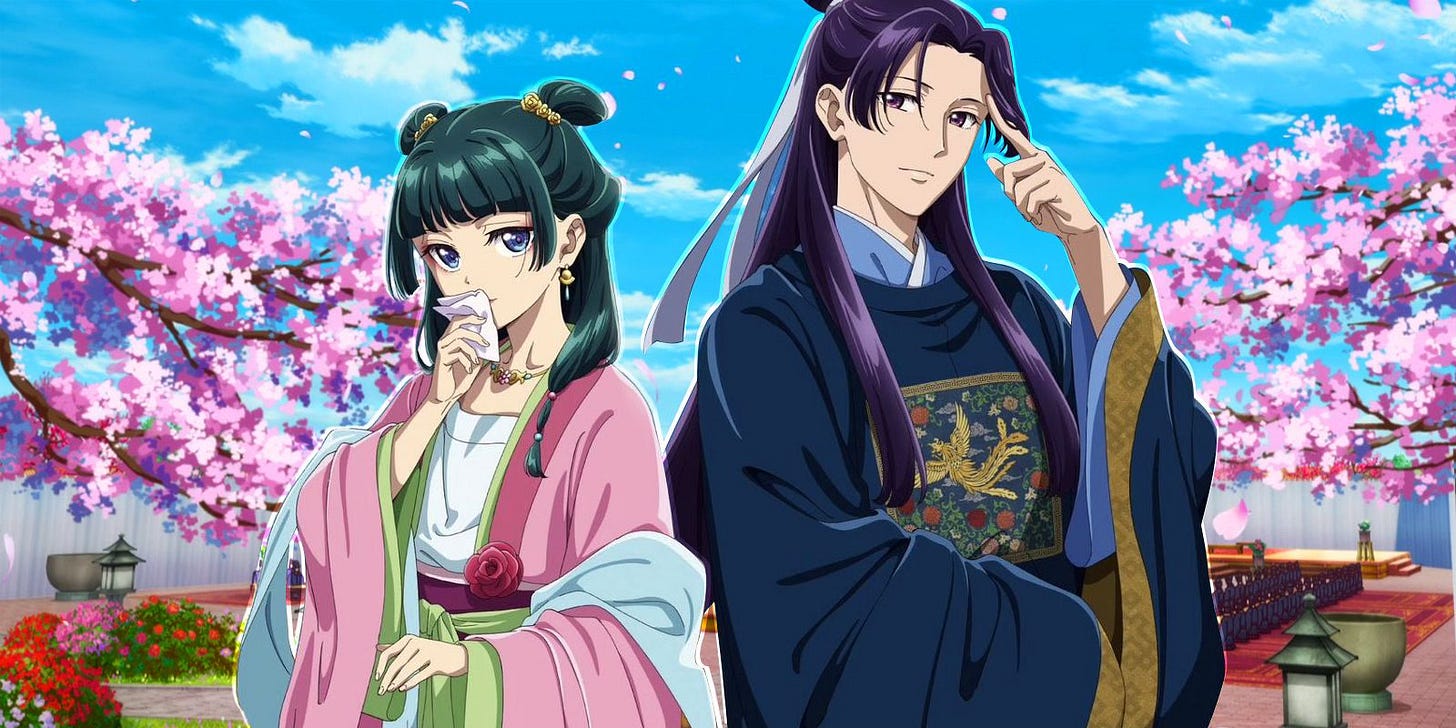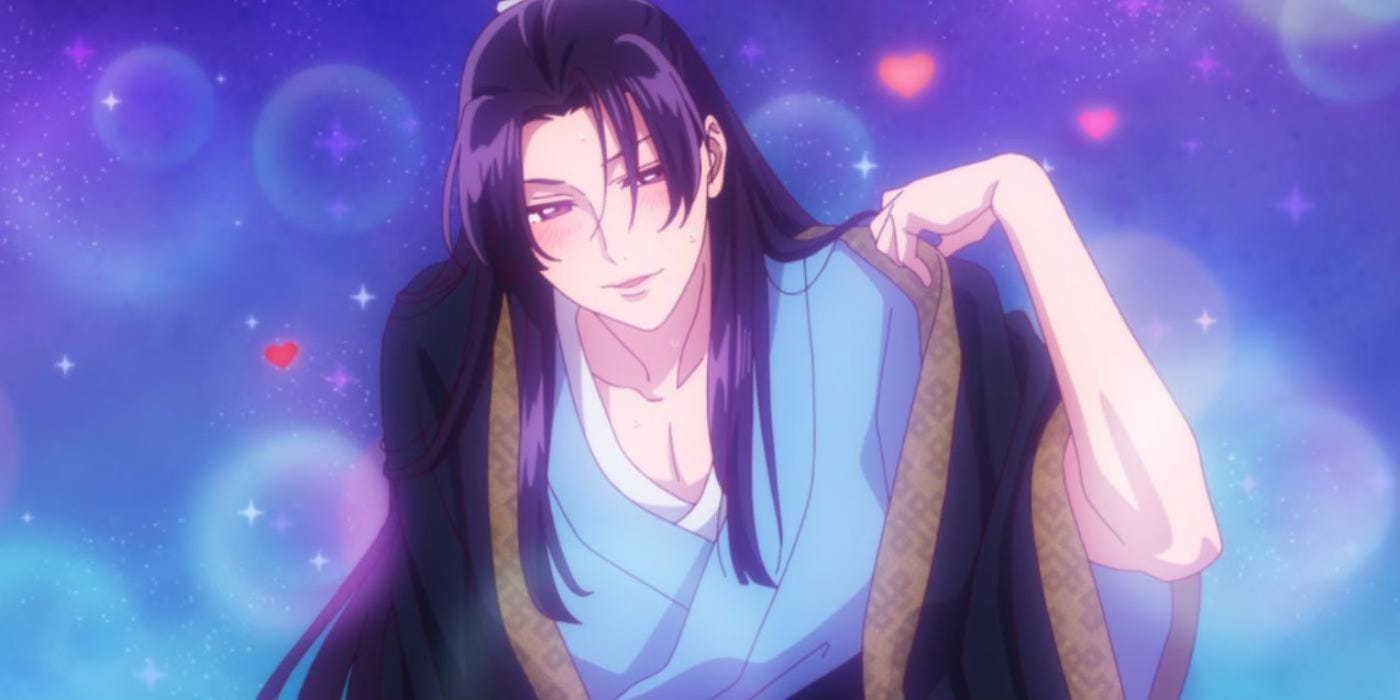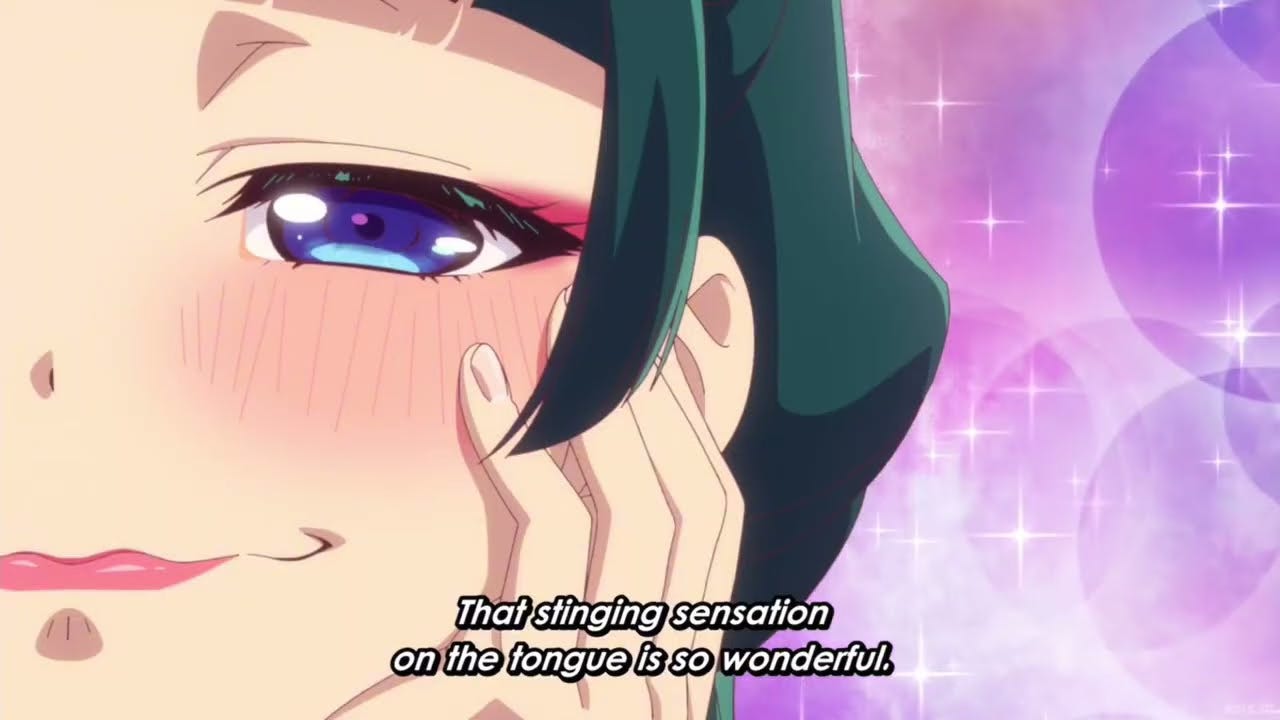Let me start by saying, I am totally a chump for Chinese Detective stories. No idea why. It is what it is. I grew up loving the Charlie Chan movies and reading the Judge Dee mysteries. It wasn’t a grand consuming passion but there were times when the mood was just perfect for one. A rainy Sunday, late in the afternoon always seemed like a good time. They drove off the long dark teatimes of the soul.
It was on such a recent Sunday afternoon when a March downpour delivered me from raking leaves, that I started looking through Neflix and, credit where it’s due, the algorithm guessed my preferences correctly and recommended The Apothecary Diaries.
The story takes place during a non-canonical Chinese dynasty, it’s sort of Tang/Ming-ish. Xiamao (called Mao-Mao) is the daughter of an apothecary and former Imperial physician. They live in the Pleasure District next to the Verdigris Palace, a house of ill-repute with the best reputation in town. That town being the Imperial Capital.
Mao-Mao has strong ties to the Verdigris Palace that she can’t sever. She was born there and is (apparently) its legal property. She doesn’t look down on the courtesans, (in fact calls them her sisters) but she doesn’t want to become one either.
Mao-Mao has a strong moral center, is highly intelligent, inquisitive, is morally flexible on the subject of human experimentation, and loves the taste of exotic poisons. She easily meets the definition of the Detective Hero Archetype with flying colors.
In many ways, the Detective is a hero for autistics. He is driven by his compulsions and obsessions. A mystery is like a pebble in a shoe to him. He can’t ignore it, it’s not possible because an unsolved mystery is intolerable to him.
…
(T)he Detective hero is also the defective hero. Unlike his opposite number the Outlaw (who is always a man of the people), the Detective is always cut off from the human race in some way or another.
The story starts when one day Mao-Mao is on her errands and she is abducted and sold into slavery. Or at least that’s the lens that Americans view it through. What happened to her is more accurately described as being conscripted by a press-gang.
Her abductors deliver her to the Imperial Palace complex. Mao-Mao is now on a mandatory two year contract, while she is paid a wage, her abductors get a cut of her wages. Any claim the Verdigris Palace has on her is superseded by the Imperium. After all, the emperor owns everything and everyone.
She is sent to work in the Rear Palace where the Imperial concubines are housed. So it’s kind of a lateral move for her more than anything else. She mostly wants to keep her head down because that’s a good way to avoid losing it. This depends on how the brutal the emperor is. The current one is as merciful as the law allows, which isn’t much.
Rank hath its privileges and Mao-Mao doesn’t have any of either. The women of the Rear Palace have their own hierarchy, the highest of which are the four most favored concubines, the Consorts; they are literal princesses. Their children are recognized as potential heirs, depending on the sex. They live in their own individual luxurious pavilions and have their own personal households. They are the most powerful women in the Rear Palace but their power relative to each other is always in flux. It depends on several factors. How often the emperor visits them, if they have they given him children, that kind of thing.
Two of the Consorts have fallen seriously ill and worse their children are sick as well. Mao-Mao because her background as an apothecary deduces the cause quickly and tries to warn them anonymously. (Again, the whole keeping her head down thing). However, she is caught out by the chief eunuch and manager of the Rear Palace, Jin-Shi.
In gratitude, one of the Consorts takes Mao-Mao into her household. Mao-mao does however get the most dreaded duty in the entire Rear Palace. No one wants the terrifying job of Food Tester… Except Mao-Mao. Given her bizarre love of poisons, it’s her dream job.
Mao-mao quickly acquires a reputation for being able to solve unsolvable mysteries. Given that the Rear Palace is a place of unending court intrigue, this puts her at considerable and increasing risk.
Natsu Hyuuga first published The Apothecary Diaries on the Japanese version of Wattpad. Square Enix decided to publish her works as a series of light novels and assigned Touko Shino to do the illustrations. Naturally this led to the manga, which was handled by Nekokurage. Most recently, it became an anime series.
The art design of the manga was lush and elegant. Proper proportion was emphasized, (except for the occasional Chibi scenes sprinkled throughout). There was a lot of gorgeous detail carefully inlaid within the manga supporting the story. Each of the Consorts has her own distinct aesthetic supporting her character, although all of them had the floating-world ethereal quality to them. This was all transferred to the anime.
In someway the art was a throwback to the 90s-era shōjo mangas. The eyes being a bit larger than is generally fashionable today. It works. Especially for the quirky character of Mao-Mao. It enhances and supports the emphasis that Mao-Mao sees the world much more differently than those around her. Her plain attire as opposed to the elaborate (indeed exaggerated) beauty of those around her creates a distinct contrast that Xiamao lives in her own world.
What I love about Mao-Mao is that she is the antithesis of the Strong Whaman caricature that has become so all pervading in Clown World Media. Her strength is in her character not her body. Her intellect is her primary weapon.
This sets her in contrast with her love interest Jin-Shi “the eunuch” (stick a pin in that one) whose primary weapon is his great physical beauty. He uses that as a mask to conceal some fairly deeply hidden depths. Since this is a shōjo story, he’s the high ranking, high status male who falls in love with Mao-Mao. He hides it as best he can behind his mask of beauty. She is the one that is clueless about it.
What makes the Apothecary Diaries special are the characters. Each seems to be fairly two dimensional at first but even the most cardboard of them like Lihaku, the good natured and thick young army officer, will eventually reveal unobserved dimensions.
The setting is almost autistically detailed for this fantasy world. This reflects a typically Japanese sentiment. “You can get the big things wrong, if you get ALL of the little things right.” It’s why Shogun was popular in Japan, while Assassin’s Creed: Shadows was so universally detested. The Lens through which court politics and interpersonal dynamics is viewed feels real because the characters and setting are so painfully detailed.
I also have to give the author credit for doing her homework on Chinese medicine. I have enough of a working knowledge that I could usually guess where a story was headed because of what poison was being used (if you write mysteries at all, you pick this stuff up). The author played fair, there was no made up ridiculous drivel which one would expect from what is basically a fantasy setting. It remains grounded if exceptionally stylized.
Mao-Mao lives in a world where women have genuinely limited agency. This is due to custom, tradition, and law. Mao-Mao navigates it through her competence and intelligence. Although, it is interesting to see the different ways the other women skirt the imposed limitations around them to achieve their goals. No, it isn’t just by the way you’re thinking. Although that does come up.
In summary if you like historical mysteries, sharp dialog, slice of life drama, and s-l-l-l-o-o-o-o-w burn romance The Apothecary Diaries is for you.
The Dark Herald Recommends with Confidence (4/5)










Please do Frieren: Beyond Journey's End!
Does it get porny?